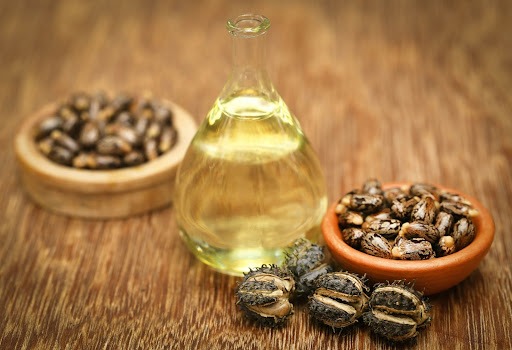Piles (Hemorrhoids)
Castor Oil for Piles: A Natural Approach for Piles Care

by admin
26th September 2023
8 minutes read
Castor oil, derived from the seeds of the Ricinus communis plant, has been used for centuries as a natural remedy for a variety of health conditions. Rich in fatty acids and with a history of medicinal use dating back to ancient Egypt, castor oil’s potential for providing relief from various ailments is truly fascinating. One such condition where castor oil uses have been lauded is in the management and treatment of piles, also known as hemorrhoids. This blog will delve deep into the benefits of castor oil for piles, revealing the potential of this natural remedy for bringing relief to many sufferers.
The Versatility of Castor Oil
The value of castor oil lies in its rich composition, primarily the fatty acid ricinoleic acid. This component is responsible for many of castor oil’s medicinal uses, owing to its anti-inflammatory, antimicrobial, and analgesic properties. It’s these properties that make castor oil a common ingredient in various skincare products, hair treatments, and natural remedies for gastrointestinal issues.
Castor Oil for Piles: A Natural Treatment
The inflammation, discomfort, and pain caused by piles can be unbearable for many. Here is where the use of castor oil shines. When applied topically, castor oil can help alleviate the symptoms of piles. Its anti-inflammatory properties can reduce swelling and inflammation, while its analgesic properties can provide much-needed relief from pain.
To use castor oil for piles, simply soak a cotton ball in natural castor oil and apply it to the affected area. You can leave it on for 15-20 minutes and then clean the area gently. Doing this once or twice daily can provide significant relief. However, it’s essential to test a small area first to ensure there’s no adverse reaction.
Castor Oil Medicine: More Than Just a Topical Treatment
While castor oil has been widely acknowledged for its topical benefits, especially in providing relief for piles symptoms, its medicinal properties extend beyond its external uses. The oil of this versatile plant holds therapeutic properties that have been used internally in traditional medicine for centuries. Here’s how castor oil serves as more than just a topical treatment:
1. Laxative: Perhaps the most well-known internal use of castor oil is as a potent laxative. Ricinoleic acid, the main fatty acid in castor oil, binds to receptors on the muscle cells of the intestinal walls. This causes the muscles to contract and push out stool, thereby helping to relieve constipation. As mentioned earlier, easing constipation can be crucial in managing and preventing piles, as straining during bowel movements is a primary cause of this condition.
2. Immune System Support: Studies suggest that castor oil may help boost the immune system. The oil may stimulate the body’s production of lymphocytes, a type of white blood cell involved in the body’s immune response. While further research is needed, this potential immune-boosting effect could help your body fight off infections and disease.
3. Anti-Inflammatory: The ricinoleic acid in castor oil has strong anti-inflammatory properties. When consumed, it can help reduce inflammation throughout the body, potentially benefiting individuals with inflammatory conditions such as rheumatoid arthritis.
4. Antimicrobial: Castor oil also has antimicrobial properties and may help fight bacterial overgrowth when taken internally. This makes it a potential aid in treating gastrointestinal issues caused by bacteria.
5. Improving Digestive Health: Due to its laxative effect and antimicrobial properties, castor oil may aid in overall digestive health by promoting regular bowel movements and maintaining a balanced gut microbiome.
However, it’s important to note that despite these potential health benefits, consuming castor oil should be done with caution due to its potent nature. Incorrect dosages could lead to unpleasant side effects, such as nausea, cramping, or diarrhea. Pregnant women, breastfeeding mothers, and individuals with certain health conditions or those taking certain medications should consult a healthcare provider before using castor oil.
Moreover, while castor oil can provide symptom relief for certain conditions like piles, it is not a substitute for professional medical treatment for severe or persistent symptoms. Always consult with a healthcare professional to get the most effective and suitable treatment for your health needs.
A Word of Caution: Castor Oil’s Potency
Despite the numerous benefits that castor oil provides, particularly for piles, it’s important to approach its usage with caution due to its potency. Here are several considerations you need to bear in mind when using castor oil for any medicinal purposes:
- Topical Application: Castor oil is generally safe for most people when applied to the skin. However, in some cases, it may cause a skin reaction, particularly for those with sensitive skin. Before using castor oil on large areas of your body, first, perform a patch test. Apply a small amount of the oil to a patch of your skin, wait for 24 hours, and check for any signs of irritation or an allergic reaction. If a reaction occurs, discontinue the use of castor oil immediately.
- Oral Consumption: Castor oil can be taken orally as a laxative. It works by stimulating the small intestine to produce more frequent bowel movements. However, the oil is highly potent, and incorrect dosage could lead to unpleasant side effects such as nausea, abdominal pain, cramping, and diarrhea. Always start with the lowest possible dose and adjust according to your body’s response.
- Pregnancy and Breastfeeding: While castor oil has been used historically to induce labor, it should not be consumed during pregnancy without consulting a healthcare provider due to the risk of stimulating premature labor. Additionally, breastfeeding mothers should also consult a healthcare provider before consuming castor oil as it could potentially transfer into breast milk.
- Interactions with Other Medications: Castor oil may interact with certain medications, particularly those that are used to slow blood clotting (anticoagulants and antiplatelet drugs). When combined, they might increase the risk of bruising and bleeding. Always inform your healthcare provider about any medication you’re taking, including castor oil.
- Existing Health Conditions: If you have a chronic health condition such as Inflammatory Bowel Disease (IBD), heart disease, or a bowel obstruction, it’s crucial to speak with a healthcare professional before consuming castor oil.
In summary, while castor oil provides many health benefits, its potent nature requires it to be used with care. Always heed the recommended dosages and consult with a healthcare provider if you have any concerns or doubts regarding the use of castor oil.
Conclusion
With its powerful properties and a broad range of uses, castor oil represents a versatile addition to your natural health toolkit. Whether you’re seeking relief from the discomfort and pain of piles or looking to prevent this common condition, castor oil can provide a natural, effective solution.
However, remember that while natural remedies like castor oil can provide symptom relief, they may not address the root cause of piles. If you’re dealing with persistent or severe symptoms, it’s always wise to consult a healthcare professional.
In conclusion, the simple, humble castor oil, a staple of traditional medicine, holds the potential to provide relief and comfort to those suffering from piles. It serves as a testament to the power of nature and the importance of exploring natural remedies in our journey toward health and well-being. So, the next time you find yourself reaching for piles of oil, consider the versatile and potent castor oil.
How Can Medfin Help?
Medfin ensures access to highly experienced doctors and surgeons with over 10 years of expertise, specifically for addressing piles. Let go of the hassles as Medfin takes care of the details, allowing you to focus on your health and find effective solutions for piles. Trust Medfin for a seamless journey toward better well-being.
FAQs
1. Can natural remedies effectively manage piles?
Yes, natural remedies can be effective in managing piles, especially in mild to moderate cases. They can help alleviate symptoms such as itching, pain, and inflammation and promote better bowel movements.
2. Can natural remedies alone treat severe cases of piles?
While natural remedies can provide relief for mild to moderate piles, severe cases may require medical intervention, including surgical options or advanced treatments like laser hemorrhoidoplasty.
It is essential to consult a healthcare professional for proper diagnosis and advice on the most suitable treatment plan based on the severity of the condition. Combining natural remedies with medical treatments may provide the best outcomes for managing piles effectively.
3. Can castor oil be used for pile relief?
Yes, castor oil is a popular natural remedy for piles relief. It has anti-inflammatory properties that can help reduce swelling and discomfort associated with hemorrhoids. Applying castor oil topically to the affected area may provide soothing relief.
4. How should castor oil be used for piles?
To use castor oil for piles, soak a cotton ball in castor oil and apply it to the external hemorrhoids. Gently massage the area for a few minutes. It is best to repeat this process several times a day for optimal results.
5. What are other natural ways to manage piles?
a. Dietary Changes: Increasing fiber intake through fruits, vegetables, and whole grains can ease bowel movements and reduce strain during bowel movements.
b. Hydration: Drinking plenty of water helps soften stools, preventing constipation and reducing discomfort.
c. Sitz Baths: Soaking the anal area in warm water can provide relief from itching and inflammation.
d. Witch Hazel: Applying witch hazel to the affected area can help reduce swelling and provide relief.
e. Aloe Vera: Aloe vera gel has soothing properties that can alleviate discomfort caused by piles.
CATEGORIES
- ACL Reconstruction
- Anal Fissures
- Anal Fistula
- Appendicitis
- ASK A DOCTOR
- Benign Prostatic Hyperplasia
- Breast Lump Excision
- Cataract
- Circumcision
- Conditions & Diseases
- Cosmetology
- Covid-19
- Cure
- Endocrinology
- ENGLISH VIDEOS
- Eye Care
- Gallstones
- General Surgeries
- Government Schemes
- Gynaecology
- Gynecomastia
- Health
- Health Insurance
- Hernia
- hindi
- Hip Arthoscopy
- Hip Replacement
- Hip Replacement Surgery
- Hydrocele
- Kannada
- Kidney Stones
- Knee Arthroscopic
- Laparoscopic
- LASER
- Latest Treatments
- Lifestyle
- Liposuction
- Medfin Stories
- Medicine
- Nephrology
- Ophthalmology
- Orthopaedic
- Paraphimosis
- Patient Testimonials
- PCL Reconstruction
- Phimosis
- Piles (Hemorrhoids)
- Pilonidal Sinus
- Proctology
- Prostate Artery Embolization
- Rhinoplasty
- Second Opinion
- Total Knee Replacement
- Uncategorised
- Urology
- uterine artery embolization
- Uterine Fibroids
- Varicocele
- Varicose Veins
- Vascular
- VIDEOS






